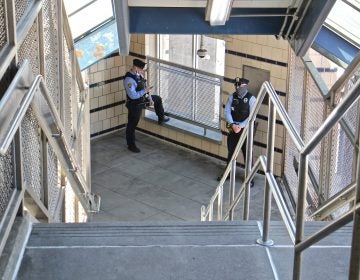SEPTA police to get new service weapons after Sig pistol accidentally fires
The Philadelphia Police Department is investigating an incident in which a SEPTA police officer’s service weapon fired without manipulation while holstered.

A transit police officer keeps watch on the Market-Frankford line. (Emma Lee/WHYY)
The Philadelphia Police Department is investigating an incident in which a SEPTA police officer’s service weapon fired without manipulation while holstered.
The incident occurred on August 26 during rush hour at Suburban Station while the officer and his partner were on patrol, according to a statement prepared by SEPTA. As the officers were exiting a SEPTA police cart they both “heard a loud bang” then smelled discharged gun powder. One of the officers found that his Sig Sauer P320, SEPTA police’s standard service weapon, discharged while secured in his thigh holster.
SEPTA police immediately alerted the PPD’s Officer Involved Shooting Investigation Unit about the discharge. There were no reported injuries.
A preliminary inspection of the weapon found no cause for the weapon’s firing without manipulation.
The agency will replace all service weapons used by officers, “out of an abundance of caution,” said SEPTA spokesperson Andrew Busch.
Busch said SEPTA made an emergency purchase of 350 new Glock 17s and holsters to replace the P320s.
He said the transit agency chose the Glock because the model is known to be safe and reliable, and manufacturers can produce the firearm quickly.
SEPTA’s new firearms will take a few months to manufacture, Busch said, but in the meantime, the authority will borrow the 350 firearms from the PPD.
The transit officers ought to have the borrowed weapons by the end of the week.
A service weapon with an alleged ‘design flaw’
This is not the first reported incident where the P320 unintentionally fired. In 2018, CNN found nine other incidents of the weapon discharging when dropped or jostled.
While SEPTA police wait for new firearms, officers are nervous about carrying a weapon that could go off at any minute without manipulation, said Omari Bervine, president of the Fraternal Order of Transit Police Lodge 109.
Bervine said officers have families and take the weapons home. If they’re fired there, results can be tragic.
“We’re just as hopeful as the department to get these things out of our holsters as quickly as the department would like to,” said Bervine. It’s for the safety of officers, safety of the public, and safety of families, he added.
Sig recently settled a $10 million lawsuit with Virginia law enforcement officer Marcie Vadnais after she filed a lawsuit claiming her P320 discharged as she was removing the holstered weapon from her belt, firing a round into her leg. The bullet shattered her femur “in several places” and caused permanent damage. The company settled for an undisclosed amount.
Also, in Pasco County, Florida, a school resource officer’s P320 discharged while holstered in a middle school cafeteria, according to reports. No injuries were reported.
Vadnais’ lawyer, Jeff Bagnell, said such incidents demonstrate the defective quality of the gun.
“If it has not already, it will result in a fatality, because the CEO will not recall the weapon,” said Bagnell.
The weapon is also at the center of a potential $5 billion federal class action lawsuit in Texas. Dante Gordon of Katy, Texas filed a complaint against the New Hampshire-based gun manufacturer on behalf of himself and those who purchased the P320 claiming the weapon is defective due to a design flaw that causes it to “drop fire,” or “discharge a round of ammunition when dropped on the ground.”
Gordon claims Sig knew about the defect since April 2016 when the U.S. Army field tested the P320. The weapon had been selected to replace the M9 as the service sidearm. The Army demanded Sig fix the deficiency by making modifications to the firing system, which included a lighter trigger. Sig immediately fixed the problem for the military versions of the P320, but continued selling defective versions to the public well into 2017. About 500,000 are believed to be in circulation, according to the suit.
Sig filed a motion for dismissal. Both parties are awaiting a judge’s final decision.
But the company did respond to reports of drop firing with a “voluntary upgrade program” for owners. The program offered free modifications to the P320, including the lighter trigger, designed to prevent such occurrences. SEPTA’s guns were among those upgraded in 2017, SEPTA said.
Also in 2017, Bagnell represented a Connecticut police officer Vincent Sheperis who was shot in the leg when his P320 fell to the ground and discharged while still in the holster. Sig and the officer also settled out of court.
Firearm retailer Omaha Outdoors reported several P320 pistols failed their “drop test” in August 2017. The retailer suspended sales of the weapon at the time until the issues was “adequately addressed by Sig.”
But incidents of discharge without manipulation continue to occur, Bagnell said.
Bagnell said he receives calls about incidents related to the Sig’s unintentional discharge regularly.
“Even minor movements of the body, impacts to the holster, a hand being placed on the gun can make this gun fire,” said Bagnell. “It’s firing and it’s failing across the country. I view it as not only a law enforcement safety issue, but it’s a serious public safety issue.”
Sig could not be reached for comment, and PPD refused to share any information, as the incident is still under investigation.
WHYY is your source for fact-based, in-depth journalism and information. As a nonprofit organization, we rely on financial support from readers like you. Please give today.







